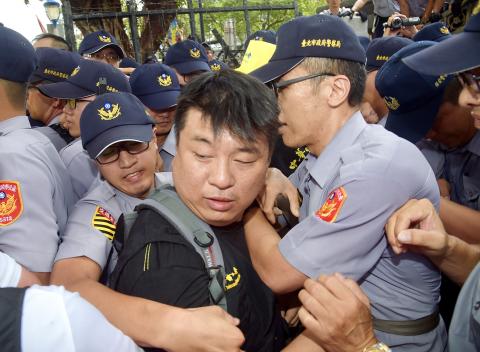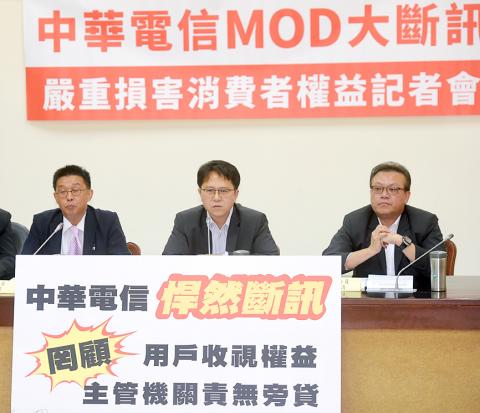Chunghwa Telecom Co (CHT, 中華電信) is to report today to the National Communications Commission on why its multimedia-on-demand (MOD) subscribers lost access to some channels and how it plans to compensate them, the commission said yesterday.
Complaints over the disruption yesterday drew the attention of lawmakers across party lines, some of whom held a news conference in Taipei to protest the company’s “disregard of consumers’ rights.”
Democratic Progressive Party (DPP) Legislator Chiu Chih-wei (邱志偉) said the service disruption stemmed from a dispute between CHT and its channel operators, and that subscribers should not suffer the consequences.

Photo: Huang Yao-cheng, Taipei Times
The telecom’s removal of channels from its MOD package at short notice affected 800,000 subscribers and hurt the reputation of the channels and the company, he said, adding that he was not satisfied with the way subscribers’ complaints had been handled.
Given its handling of the situation, CHT could have trouble hitting its target of 2 million MOD subscribers by the end of this year, Chiu said.
Chinese Nationalist Party (KMT) Legislator Apollo Chen (陳學聖) said that as the government is CHT’s largest shareholder, serving the public interest should be the company’s top priority, not profits or number of subscribers.

Photo: Huang Yao-cheng, Taipei Times
The government has relaxed numerous restrictions on the MOD service, which has allowed it to compete unfairly with cable systems, Chen said.
National Communications Commission Business Management Department Director Chen Kuo-long (陳國龍) said CHT has been ordered to send representatives to brief commissioners today about the dispute and how it plans to handle the complaints.
The commission has already asked CHT to increase its number of client service representatives to handle the complaints, he said.
Channel operators are supposed to pay CHT for inclusion on MOD, while the telecom pays the channels’ content authorization fees out of the subscription fees it collects from consumers, the commission said.
By law, channel operators, not CHT, can decide how to divide the content authorization fees among themselves, it said.
CHT, as a platform operation, is entitled to set the pricing scheme for channel lineups, as well as the conditions for channel operators to qualify for discounts, the commission said.
The dispute stems from CHT’s decision to charge lower lineup fees for channels that have higher ratings. Not all channels agreed to the change.
CHT’s contract with the channel operators expired on Friday last week and since it failed to reach an agreement with those channel operators who disagreed with its new scheme, it had to remove the channels from MOD, the commission said.
CHT northern business group vice president Chang Yi-fong (張義豐) said the telecom only provides a broadcast platform and does not decide what channels go into which service packages, the various agents representing the channels do.
It has no say on how channels are bundled or the subscription fees set by each channel, he said.
“We risk infringing content copyrights if we air programs before reaching an agreement with the channel operator,” Chang said.
The 46 channels that were removed from the deluxe service package are still part of MOD and consumers can subscribe to them individually or as a whole, he said.
CHT has agreed to compensate the affected subscribers, who will receive the service free for a week.

US President Donald Trump yesterday announced sweeping "reciprocal tariffs" on US trading partners, including a 32 percent tax on goods from Taiwan that is set to take effect on Wednesday. At a Rose Garden event, Trump declared a 10 percent baseline tax on imports from all countries, with the White House saying it would take effect on Saturday. Countries with larger trade surpluses with the US would face higher duties beginning on Wednesday, including Taiwan (32 percent), China (34 percent), Japan (24 percent), South Korea (25 percent), Vietnam (46 percent) and Thailand (36 percent). Canada and Mexico, the two largest US trading

AIR SUPPORT: The Ministry of National Defense thanked the US for the delivery, adding that it was an indicator of the White House’s commitment to the Taiwan Relations Act Deputy Minister of National Defense Po Horng-huei (柏鴻輝) and Representative to the US Alexander Yui on Friday attended a delivery ceremony for the first of Taiwan’s long-awaited 66 F-16C/D Block 70 jets at a Lockheed Martin Corp factory in Greenville, South Carolina. “We are so proud to be the global home of the F-16 and to support Taiwan’s air defense capabilities,” US Representative William Timmons wrote on X, alongside a photograph of Taiwanese and US officials at the event. The F-16C/D Block 70 jets Taiwan ordered have the same capabilities as aircraft that had been upgraded to F-16Vs. The batch of Lockheed Martin

GRIDLOCK: The National Fire Agency’s Special Search and Rescue team is on standby to travel to the countries to help out with the rescue effort A powerful earthquake rocked Myanmar and neighboring Thailand yesterday, killing at least three people in Bangkok and burying dozens when a high-rise building under construction collapsed. Footage shared on social media from Myanmar’s second-largest city showed widespread destruction, raising fears that many were trapped under the rubble or killed. The magnitude 7.7 earthquake, with an epicenter near Mandalay in Myanmar, struck at midday and was followed by a strong magnitude 6.4 aftershock. The extent of death, injury and destruction — especially in Myanmar, which is embroiled in a civil war and where information is tightly controlled at the best of times —

China's military today said it began joint army, navy and rocket force exercises around Taiwan to "serve as a stern warning and powerful deterrent against Taiwanese independence," calling President William Lai (賴清德) a "parasite." The exercises come after Lai called Beijing a "foreign hostile force" last month. More than 10 Chinese military ships approached close to Taiwan's 24 nautical mile (44.4km) contiguous zone this morning and Taiwan sent its own warships to respond, two senior Taiwanese officials said. Taiwan has not yet detected any live fire by the Chinese military so far, one of the officials said. The drills took place after US Secretary